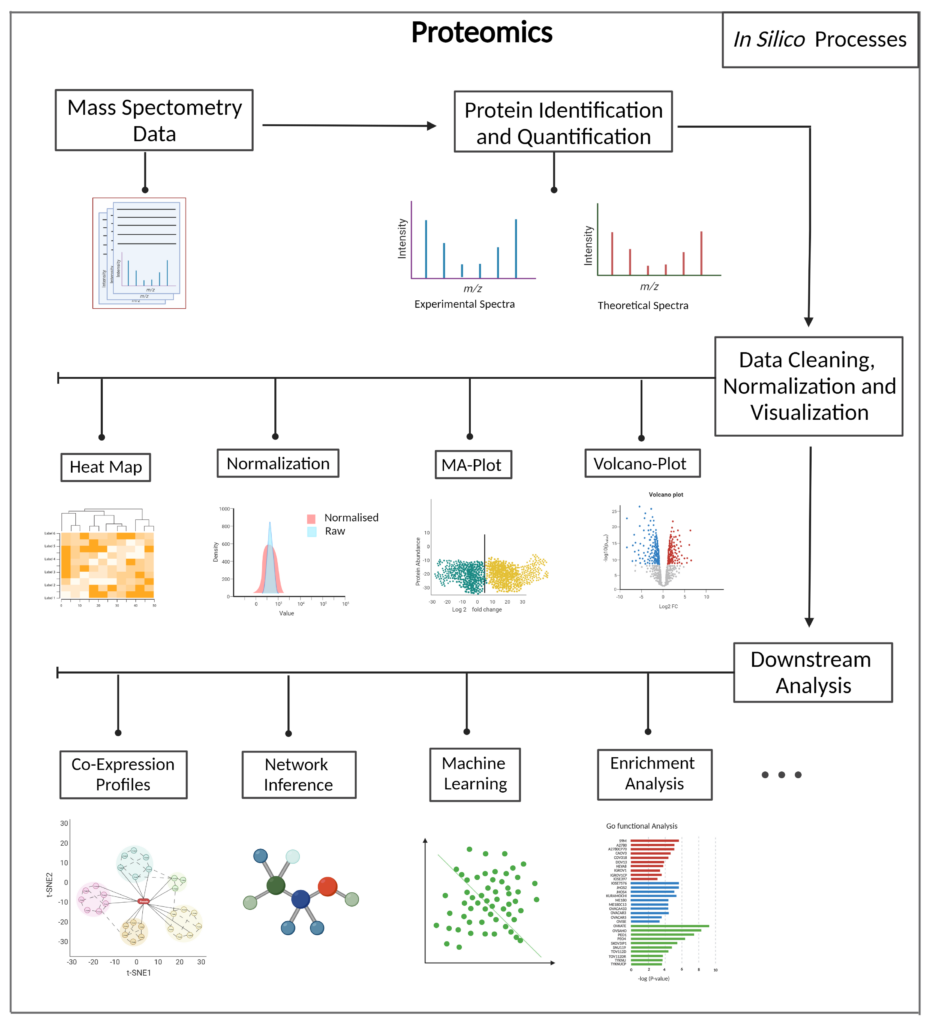Proteomic analysis pipeline
In silico proteome analysis for biomarker identification aiding accelerated drug discovery for precision medicine
Biomarker identification is crucial for novel drug discovery and development. Proteomics is a powerful biomarker detection and identification technique through proteome characterization and assessment. We integrate the latest technological developments and statistical tools to facilitate quick and accurate biomarker identification. Our multidisciplinary teams leverage their experience and expertise in data sciences, biology, and chemistry to develop high-throughput solutions for biomarker detection.
Our Proteomics analysis offering includes the following:
End-to-end Biomarker detection pipeline
On-demand customizable Biomarker detection services
Highlights
Key components of our Proteomics service:
Processing proteomics data
From mass spectrometry data sets using either TPP Pipelines or MaxQuant or from plasma proteins using affinity-based assays like high-throughput Olink Proximity Extension Assay
Data quality control
Detection and elimination of general and non-specific protein contamination and making protein abundance samples comparable and reliable through normalization to correct for bias
Differential analysis
Analysis and comparison of distinct proteomes in different conditions: healthy vs. diseased samples or pre vs. post-treatment samples
Enrichment analysis
Identifying specific functional pathways, biological processes, and cellular locations affected/involved in a particular disease or response mechanism
GWAS integration
Integrating proteomic analyses with GWAS results to identify genome variants and their functional correlation in the organism’s proteome
Benefits
Researchers have unique needs based on research study, therapeutic modality focus, and disease area. As a service provider, we realize the need for more than a standard pipeline. We provide end-to-end services for the proteomics analysis customizable as per the user-defined problem statement. Details of our data processing and data quality control services are as below:
Data Procesing
Using inputs from mass spectrometry datasets or plasma proteins
TPP Pipelines
Open-source mass spectrometric data processing pipeline for protein assignment, quantification, and validation using TPP Petunia GUI or command-line interface scripts
MaxQuant
End-to-end solution using mass spectrometry datasets as inputs and providing various output tables like level of protein groups, peptide-serum matches, and peptides
Affinity-based assays
Using plasma serum data to link protein-specific antibodies to DNA-encoded tags to research diverse biological processes
Data Quality Control
Essential for sound research and robust downstream analysis
Data Cleaning
Removal of non-protein molecules or peptides as well as low-quality and ambiguous samples. Use of Imputation methods to fill in missing values and data integration to combine dataset from multiple sources resulting in increased statistical power and more profound insights
Data Filtering
Large-scale mass spectrometry datasets transformed into more trustworthy and accurate proteome information using pre and post-filtering database search tools
Data Visualization
Analysis and interpretation of data using scatter plots, heatmaps, and volcano plots to explore relationships between proteins, highlight differences between experimental groups, and identify potential biomarkers or pathways that may be significant for further research
Normalization
Accounting for bias to make samples more comparable using various regression techniques to ensure reliable downstream analysis and results
Discover our offerings across the biopharma value chain
Our Solutions
Customizable platforms and solutions across the drug discovery value chain from target discovery to therapeutic development
Read More
Our Services
Offering services in computational sciences and technology to complement biopharma R&D
Case Studies
Helping clients accelerate drug discovery and development by building computational biology, computational chemistry, technology, and cloud solutions
Read More
